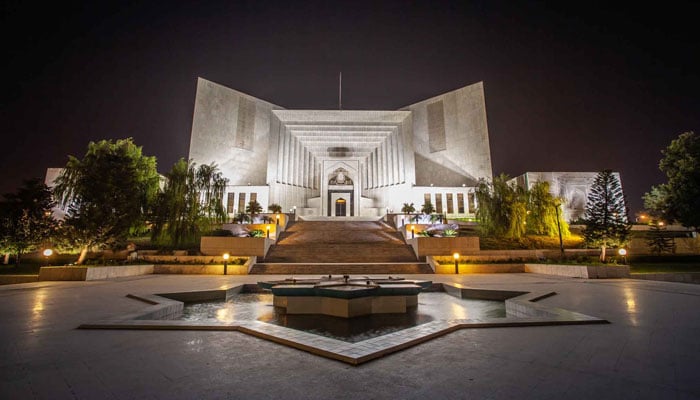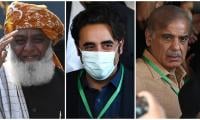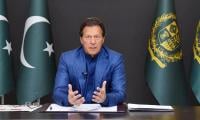Doctrine of necessity buried: Supreme Court restores National Assembly, orders voting on no-confidence motion
Ruling issued by five-member bench headed by CJP Umar Ata Bandial
ISLAMABAD: The Supreme Court on Thursday restored the National Assembly, declared the president's decision to dissolve it null and void, and said that the NA Deputy Speaker Qasim Suri's ruling to stop the no-confidence motion against Prime Minister Imran Khan was against the Constitution.
The five-member bench of the SC, headed by Chief Justice of Pakistan Umar Ata Bandial, read out the short order and restored the National Assembly.
Important points from the judgment:
- NA deputy speaker’s ruling declared unconstitutional
- National Assembly has been restored
- PM’s advice to dissolve National Assembly
- SC orders President Arif Alvi to convene the NA session on April 9
- NA to hold voting on the no-confidence motion on Saturday
"In consequence of the foregoing, it is declared that at all material times the Prime Minister was under the bar imposed by the Explanation to clause (1) of Article 58 of the Constitution and continues to remain so restricted. He could not, therefore, have at any time advised the President to dissolve the Assembly as contemplated by clause (1) of Article 58," said the order.
"In consequence of the foregoing, it is declared that the advice tendered by the Prime Minister on or about 03.04.2022 to the President to dissolve the Assembly was contrary to the Constitution and of no legal effect," said the order.
The Supreme Court also "declared that the Assembly was in existence at all times, and continues to remain and be so".
The top court has ordered National Assembly Speaker Asad Qasier to summon the session on Saturday (April 9) no later than 10am to vote on the no-confidence motion against the premier.
"...if the no-confidence motion against the prime minister succeeds, then the assembly will appoint the new prime minister," the top court's order said.
The apex court also stated that the speaker cannot prorogue the assembly and bring the session to an end if the no-trust motion fails or after a new prime minister is elected if a no-confidence motion is passed.
The court ruled that no member will be barred from casting their vote. It also stated that if the no-trust motion fails then the government will continue to carry out its affairs.
Earlier while hearing the suo-motu notice, CJP Umar Ata Bandial said they would announce the verdict of the case related to National Assembly Deputy Speaker Qasim Suri’s ruling blocking the vote of no-confidence against Prime Minister Imran Khan after holding hearings for five-consecutive days.
Following the conclusion of the arguments by all the parties, the top court reserved its verdict which was announced tonight.
On April 3, Chief Justice of Pakistan Umar Ata Bandial had taken a suo motu notice of the constitutional crisis that erupted after Suri disallowed voting on the motion, deeming it "unconstitutional and foreign-funded" — a move that the Opposition said was a blatant violation of the Constitution.
Read more: Revival of ‘necessity doctrine’ feared
After hearing the AGP’s arguments, CJP Bandial remarked that it is clear that the ruling of National Assembly Deputy Speaker Qasim Khan Suri was erroneous.
“The assembly could not be dissolved during the no-confidence motion,” the CJP observed, adding that the dissolution of the assembly after tabling the resolution in the house was against the Constitution.
The AGP argued that the assembly could only be dissolved when the no-trust motion has been dispelled.
Shahbaz urges SC to restore parliament
Meanwhile, when Leader of the Opposition in the National Assembly Shahbaz Sharif was called to the rostrum, he said that if the court acknowledges that the ruling of the deputy speaker was “erroneous”, then it should restore Parliament.
Shahbaz further highlighted that if the deputy speaker’s move was unconstitutional then decisions taken by PM Imran Khan with the help of President Arif Alvi are also “insignificant”.
“The no-confidence motion against PM Imran Khan will automatically be restored once the apex court rules out the ruling of the deputy speaker,” he said.
Calling the ruling of the deputy speaker “unconstitutional and illegal”, the PML-N leader said that voting was to be held on April 3 and “constituencies cannot be dissolved during the proceedings.”
He highlighted that several government allies and MNAs joined the Opposition, assuring the five-member bench that the joint Opposition will protect the Constitution of Pakistan.
CJP Bandial said that the proceedings of the court are being held under Article 184 (3) as this is a public interest case.
Shahbaz further added that political stability is inter-connected with the Constitution of Pakistan.
During the cross-questioning session, Justice Mandokhel asked Shahbaz that the Opposition has been demanding fresh elections and now that they have the opportunity, why are they against it?
Replying to his question, Shahbaz said that the election has been “stolen” and laws of the Constitution have been “violated”; to which Justice Mandokhel said that all laws that have been violated will be restored.
‘Will not defend deputy speaker’s ruling’
During the hearing, AGP Khalid Jawed Khan excused himself from defending NA Deputy Speaker Qasim Khan Suri’s April 3 ruling.
Khalid Jawed Khan argued that his focus is on new elections in the country. Those who have been dubbing the assembly as selected for the past four years now wanted to become the prime minister of the same assembly, he added.
Meanwhile, Jamal Khan Mandokhail noted that it seemed that the speaker issued the ruling considering himself above all others.
During the course of the proceedings, Attorney General for Pakistan (AGP) Khalid Jawed Khan apprised the Supreme Court that the parliamentary proceedings do not have complete immunity.
He said, “I do not think that parliamentary proceedings have complete immunity.”
The AGP apprised the top court that the leave was granted to move the no-trust motion against the prime minister on March 28 by the Lower House.
The attorney general maintained that the military leadership was present in the National Security Committee (NSC ) meeting, adding that the participants of the meeting were briefed on “very sensitive issues”.
He maintained that he could not give his arguments over the minutes of the NSC meeting in open court. He, however, offered to give an in-camera briefing to the court on the minutes of the NSC meeting.
Continuing his arguments, he said there were 161 MNAs in the assembly when the leave was granted on March 28, adding that “172 lawmakers are required for the no-confidence motion to succeed.”
He maintained that the no-confidence had already been dismissed on March 28.
The attorney general maintained that the prime minister has the power to dissolve the assembly as he is the chief stakeholder, adding that it is not necessary to give a reason for dissolving the NA.
“The assembly will dissolve itself after 48 hours if the president did not make a decision on the prime minister’s advice,” he added.
“Casting a vote on the no-confidence motion is not the basic right of any MNA,” he said, adding that the right is linked with the Constitution and the assembly rules.
“Are you saying that right is linked with rules under Article 95?” asked the CJP.
The AGP said that the government is formulated in the House and the Constitution talks about the five-year term of the House, but not of its members. If the speaker suspends any member, he cannot move the court against the decision, he added.
'Court can intervene if any act has an effect outside Parliament'
CJP Bandial asked if the NA proceedings did not have an effect on the situation outside of Parliament in this case.
"The court can intervene if any action has an effect outside Parliament," the CJP remarked.
Meanwhile, Justice Alam inquired if any unconstitutional act in Parliament has constitutional immunity.
Whereas, Justice Mandokhel asked if there isn't any solution if an unconstitutional act takes place in Parliament.
At this, Barrister Zafar replied that Parliament has to solve the issue and the solution is to go to the people [election].
Referring to a past judgement, Zafar said that a member in the House of Commons wasn't allowed to take oath as the court declared that it cannot interfere.
At this, CJP Bandial asked what should be done if there is injustice in Parliament.
"Is the formation of federal government an internal affair of Parliament?" he asked.
In his response, Barrister Zafar said that the election of a prime minister or a no-confidence motion "is an internal affair of Parliament."
"The NA is constituted to elect its speaker and prime minister. However, the court can review the formation of federal government and dissolution of assembly" he added.
At this CJP Bandial said that it would have been determined who will be the premier had the vote of no confidence against PM Imran Khan held.
Meanwhile, Justice Mandokhel noted that Parliament is responsible for legislation.
"What would happen if Parliament doesn't legislate?” he asked.
To this, Barrister Zafar said that the old laws would stay in place if legislation is not done.
Democracy and election cannot be put asunder, Barrister Zafar said, adding that voters are the most empowered.
Referring to the end of the Mohammad Khan Junejo-led government, Zafar said that the court had declared it anti-Constitutional.
"The court declared that the people will decide as the matter is going towards the election,” Zafar said, requesting the apex court to rule that the decision be left to the people of Pakistani even if an illegal act has been done.
Justice Alam noted that the court has the case of no-confidence in front of it, directing Zafar to address the speaker's ruling that came after the resolution of no-confidence was tabled.
At this, Zafar said that the dissolution of the Assembly was announced in the current case as well.
‘No constitutional crisis in Pakistan’
Meanwhile, CJP Bandial asked Zafar to share what the constitutional crisis is.
"Where is the constitutional crisis if everything is happening as per the Constitution? There is no constitutional crisis in Pakistan," the top judge remarked.
He noted that the speaker's ruling is apparently a violation of Article 95.
"Can anyone call a new election by giving a ruling if they are failing? Billions of rupees are spent on elections," CJP Bandial remarked.
In today's hearing, Attorney General for Pakistan (AGP) Khalid Jawed Khan, Imtiaz Rasheed Siddiqui — representing Prime Minister Imran Khan — and Naeem Bukhari — the counsel for NA Speaker Asad Qaiser and deputy speaker will give arguments.
It is worth mentioning that during yesterday's hearing, PTI’s lawyer Babar Awan as well as Senator Ali Zafar, representing President Dr Arif Alvi, had argued before the Supreme Court.
Babar Awan had presented arguments over the constitutionality of Suri's ruling, while Arif Alvi's lawyer Ali Zafar deliberated on the boundary between the judiciary and the legislature under Article 69 of the Constitution.
"The SC wants to wrap up the case today", Chief Justice of Pakistan Umar Ata Bandial had said on Wednesday.
“We first want to wrap up the case on what happened in the NA on April 3."
-
Security forces gun down 30 terrorists in multiple IBOs in KP: ISPR
-
MQM-P calls for new province in Sindh
-
US report validates Pakistan military edge over India: PM
-
Banned TTP poses serious threat to Pakistan security: UNSC panel
-
CM Afridi clarifies remarks on by-poll after ECP requests army deployment
-
Dubai sees 3.2m Pakistani passengers in 2025 as airport sets new milestone
-
Security forces kill 23 Indian proxy terrorists in KP's Kurram
-
Pakistan to construct island to boost oil exploration: report














